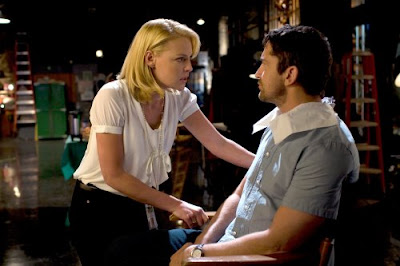The Ugly Truth of the voyeuristic crowd
 Since when did romantic comedies have anything to do with truth? They have swooping bird's-eye-view shots of colorful dewy Hallmark card landscapes, gruff men like Rochester or Clark Gable who will be tamed, lovelorn maidens like Katherine Heigl who would not seem to need romantic advice, and a plot structure as rigid and formalized as Kabuki theater, so I've been a bit surprised by the virulently negative critical reaction to to The Ugly Truth. Yes, it is mediocre and more vulgar than the wedding porn of 27 Dresses, but not as bad as Bride Wars or Confessions of a Shopaholic. The two leads of The Ugly Truth strike me as plausible if not quite fully realized stars (stars with potential), and the film is uneven but occasionally amusing.
Since when did romantic comedies have anything to do with truth? They have swooping bird's-eye-view shots of colorful dewy Hallmark card landscapes, gruff men like Rochester or Clark Gable who will be tamed, lovelorn maidens like Katherine Heigl who would not seem to need romantic advice, and a plot structure as rigid and formalized as Kabuki theater, so I've been a bit surprised by the virulently negative critical reaction to to The Ugly Truth. Yes, it is mediocre and more vulgar than the wedding porn of 27 Dresses, but not as bad as Bride Wars or Confessions of a Shopaholic. The two leads of The Ugly Truth strike me as plausible if not quite fully realized stars (stars with potential), and the film is uneven but occasionally amusing.In comparison to the pretty boy leads of films like Elizabethtown, Gerald Butler is sufficiently masculine for his role as Mike, a local television network "talent" who dares to say what men really want (trashy lingerie, twins in a bath full of jello, etc.) on his Ugly Truth show (and, of course, the conclusion of the movie undermines everything he says).

His beard stubble reminded me of the facial hair of Luke (Scott Patterson) in Gilmore Girls, since he's more a sanitized stand-in for loutish manhood than anything else, but Mike does make occasional good points about seduction techniques and how women sometimes abuse their power over men. Like a more articulate media-friendly Bluto from Animal House, he represents the id, and his wisecracks liven up the Mary Tyler Moore-esque KSXP TV station where he gets a job as the guest commentator who works under anal "psycho control freak" producer Abby (Katherine Heigl).

Having seen Heigl in the more classy 27 Dresses, I was surprised to see her willingness here to simulate a lewd act twice in one baseball game scene, strap on a mechanically arousing pair of panties for some heavy breathing in a crowded restaurant (somewhat like Meg Ryan's famous orgasm scene in When Harry Met Sally), and otherwise allow herself to be besmirched by the filmmakers' smutty gross-out humor agenda designed for the guys taking their dates to see this chick flick.
There seems to be a competition to see how raunchy R-rated films can get by innuendo these days, a kind of snickering naughtiness found in films like Sex and the City (and overwhelmingly apparent in Bruno), but I was mostly bothered by the emotional voyeurism on display in The Ugly Truth. In 27 Dresses, characters frequently proclaim their love in front of a crowd as if expressions of passion are not enough in private. The emotion has become so banal, you need a bunch of people looking on to make the scene dramatic. In The Ugly Truth, this need for display extends itself to the camera and the TV audience.
 When Mike confronts married couple/newscasters Georgia and Larry (Cheryl Hines and John Michael Higgins) with the problems in their sex life on air, saying that Larry hates her for "screwing with his manhood," Larry immediately opens up and says "It's not my fault!" Laying bare their intimate sex secrets becomes the film's definition of "great TV," just like Abby's visit to a baseball game only begins to register when she appears on the big screen by the scoreboard. I was just reading about Hal Niedzviecki's new book The Peep Diaries, and it seems to describe what's going on exactly. To quote from Amanda Fortini's Salon review:
When Mike confronts married couple/newscasters Georgia and Larry (Cheryl Hines and John Michael Higgins) with the problems in their sex life on air, saying that Larry hates her for "screwing with his manhood," Larry immediately opens up and says "It's not my fault!" Laying bare their intimate sex secrets becomes the film's definition of "great TV," just like Abby's visit to a baseball game only begins to register when she appears on the big screen by the scoreboard. I was just reading about Hal Niedzviecki's new book The Peep Diaries, and it seems to describe what's going on exactly. To quote from Amanda Fortini's Salon review: "Peep culture involves watching and being watched, snooping and spying, gawking and gossiping; it means exposing our intimacies with an eye toward bonding with others and growing comfortable with the increasingly common slippage between public and private. Peep culture, like pop culture, informs the atmosphere — it is the atmosphere — in which we live. Writes Niedzviecki, `It’s like that famous line about pornography: you know it when you see it. And you do see it. All the time, everyday, everywhere.'”
In its peep show way, in the climax of this film, in their moment of greatest emotional vulnerability, Mike and Abby don't even know that they are on camera, but they are, and for some reason that heightens the scene. That may be the real ugly truth--romantic comedies increasingly need a large built-in voyeuristic audience to make love matter at all.


Comments